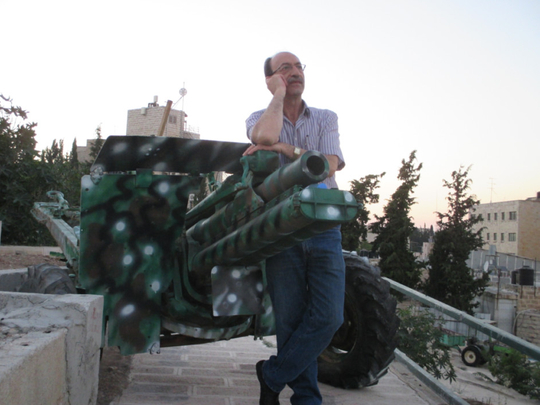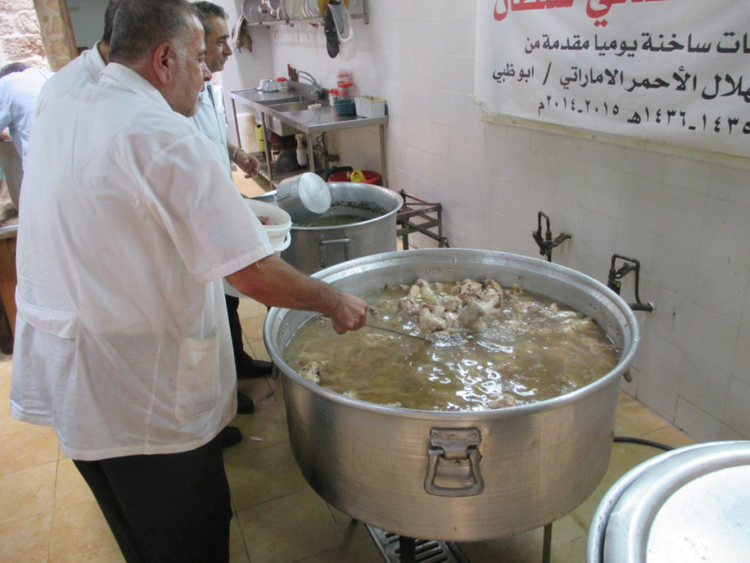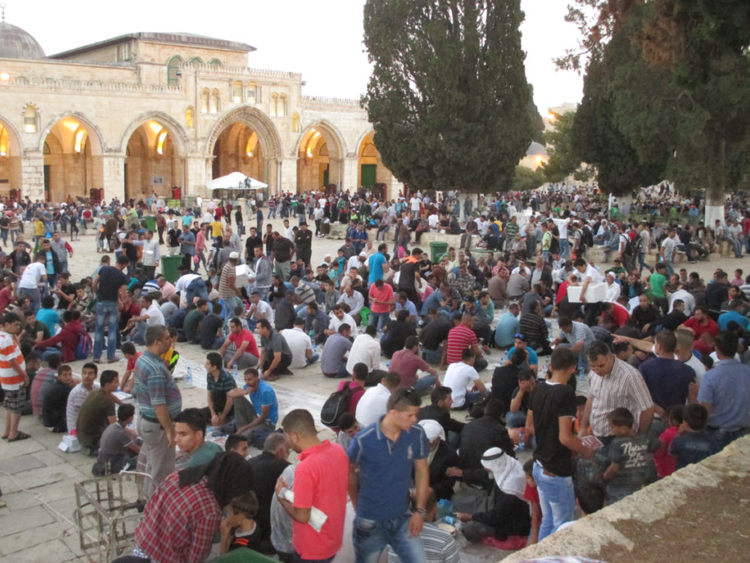
The Old City of occupied Jerusalem — the most hotly contested piece of land and the seat of three monotheistic faiths of the world — is where religion and age-old tradition not only meet, but have also stood the test of time.
During Ramadan, especially in the noble sanctuary of Al Aqsa and its vicinity — considered a “blessed place” by virtue of divine revelation — this manifests itself in many ways.
For one, during the “iftar”, hundreds of faithful gather and seat themselves on the cobblestones that cover the courtyard around rows of food supplied by a host of international charities. Truckloads of food and water enter the sacred grounds, accompanied by scores of volunteers who offload and set the food parcels and water across neat rows. Some film and photograph the whole scene for the benefit of the donors that their noble deed was indeed accomplished.
Each parcel contains the appropriate dietary and calorific needs of the faithful who have abstained from food and water from dawn to dusk. While women are seated separately in the area adjoining the Dome of the Rock, this daily ritual captures perfectly the brotherhood and bonhomie. Strangers sit beside each other to end the fast.
Many Palestinian families bring along their own food and seat themselves under the ancient olive trees — all in a festive atmosphere. Everyone then waits for the sound of the cannon booming across the eastern part of occupied Jerusalem, to signal the ending of the fast.
The story of the firing of the cannon is part of the mosaic of tradition and dates back to over a century, as most things in this part of the world. It is believed to have started in the Egyptian capital of Cairo, but the practice was adopted just outside the walls of the Old City a long time ago.
In occupied Jerusalem, the responsibility of firing the cannon has fallen upon the Sanduqa family. And they have been doing this for the past 135 years, a tradition proudly handed down from father to son. They fire a rusty 1918 cannon from the top of a Muslim cemetery close to a bustling shopping street in east occupied Jerusalem to signify the end of the fast.
East Jerusalem was occupied by Israel in 1967 and the Israeli army has imposed restrictions on the use of the cannon. The Ramadan cannon is fired just before the call to prayer. Earlier, it could be heard every morning and evening to signify the start and end of fasting, but now its use is limited to the evenings and the types of explosives used have changed.
A loud boom reverberates across the sanctuary, immediately followed by the “adhaan” and the ending of the fast.
This year, with Israel giving more West Bank Palestinians access to enter occupied Jerusalem, the grounds are crowded. However, no one goes hungry — everyone gets a plate of food and water to drink.
After the meal, the cleaning begins. Teams of volunteers have to complete the task before the evening prayer begins. When the cleaning is over, trucks that brought in the food are seen driving away with the waste. Young Palestinians, most of whom are teenagers, work passionately, driven by faith. Over the years they have fine-tuned this tradition to excellence.
Earlier in the day, another old tradition plays out at the Khasiki Sultan soup kitchen. Located adjacent to Al Aqsa, the cooking at the kitchen begins at about 10am. At exactly 1.30pm, dozens of women and children rush through the door of the kitchen, clutching their pots and pans.
They jostle for position in front of steaming vats of chicken and rice, waiting for their pots to be filled for “iftar” later in the day.
For more than 120 families, this daily ritual in the heart of the Old City is not just for Ramadan. The Al Aqsa Waqf has been feeding the needy families for 450 years, with help from private donations and the UAE Red Crescent Society has been generously providing food for the past four years.
This soup kitchen was built by Sultan Suleiman the Magnificent’s wife, Khasiki Sultan, during the Ottoman Empire in the 16th century.
Jamal Jabr, the resident cook, says: “We provide a meal a day for poor families, including Palestinian Christians. Poverty does not know religion. It affects everyone, especially in the Old City, where Israeli taxes push people into poverty, driving them out subsequently.”
Jabr decides on the daily menu, mixing it up with poultry, meat, legumes and vegetables. “We never ever have a surplus of food. Everything gets distributed. During Ramadan, we cook more and provide meals on Fridays and Saturdays too, which doesn’t happen the rest of the year. Usually, we cook extra on Thursdays so that people can take more for the weekend.”
Abu Ali, a beneficiary, says, “I am ailing, and unable to work. This place has been providing food for me for the past four years. Were it not for them, I don’t know if I would be alive.”
Dr Yusuf Natsheh, a historian with the Al Aqsa Waqf who has written extensively on the kitchen and its beginnings, says in the early 16th century, more than 550 people would get soup twice daily, with occasional meat and rice. “Charity in Islam, especially donating food to the needy, is a well-known and established custom throughout the Islamic world.”
Those who come to receive food at the kitchen may not stop to admire the beauty of its historic architecture, but that is not lost on the visitors to the Old City.
“This food is a blessing. I have been coming here for a year and I thank the people who work here and the kindness among Muslims,” says a woman who had just offered prayers at Al Aqsa mosque. She has come to collect food before she returns to her home in the West Bank.
By 2.30pm, the huge pots are empty and it’s time for Jabr and his team to clean up, close the kitchen and head for their homes in the Old City.
Late evening, yet another tradition can be witnessed. Residents of the Old City start getting into the spirit of Ramadan, preparing sweets and coffee in their homes. These are given to the faithful departing after the night prayers from the many gates of Al Aqsa.
The true nature and spirit of charity and sharing of food is all-pervasive in the Old City during Ramadan, something that scores of Palestinians and tourists alike marvel at.
Rafique Gangat, author of “Ye Shall Bowl on Grass”, is based in occupied Jerusalem.














